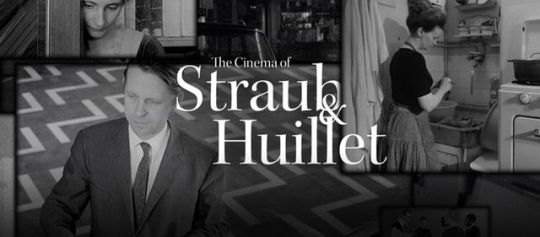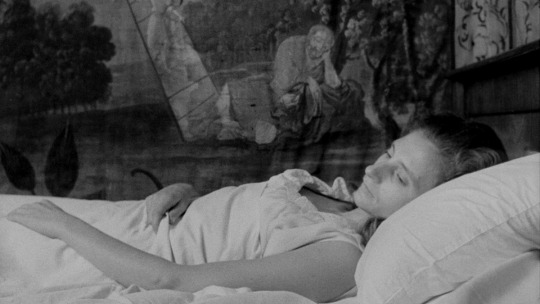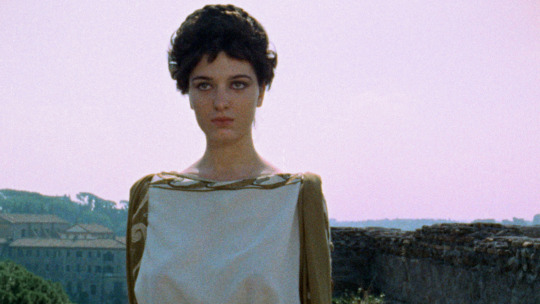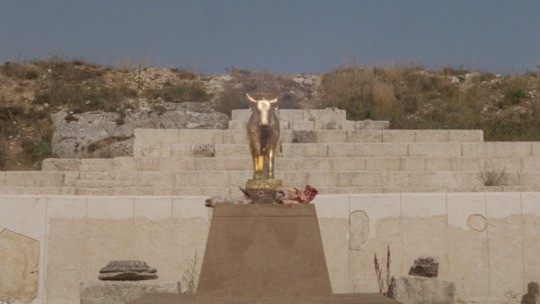#Politically engaged than many of the other filmmakers working in the genre in Italy at that time (or should I say more visibly political)
Photo

Classifying the Films of Jean-Marie Straub and Daniele Huillet by Stuart Collier
The films of Jean-Marie Straub and Daniele Huillet — it is said time and time again — are challenging, rigorous, alienating, invariably belonging to a mode of filmmaking that uses cinema as a means of accessing the Western cultural past. Jean-Luc Godard, Pier Paolo Pasolini, Derek Jarman, among many others, have similarly sought to filter ancient texts through the medium of cinema, and, in the process, to creatively resolve those heated junctures where antiquity and modernity don’t quite mesh together. Yet Straub and Huillet’s commitment to this demanding, dialectical approach to filmic storytelling was uniquely all-consuming: with very few exceptions, each of their feature films tackles an exceptionally ambitious source, be it Franz Kafka or Sophocles, and pushes the art of adaptation to new experimental heights.
Now, this is not to say that these films are inaccessible, deified works of art more fitting for the museum or the lecture hall than the home media center. I would like to cast this duo’s films in a less demanding light. For all of the textual interpolations and formal rigor of these films, they are far from confusing — rather, the subject matter of each film is approached with a directness uncommon in most narrative cinema. In fact, I would even propose that they can be classified according to genre, and that these recognizable forms of storytelling can help us to understand what makes Straub and Huillet so unique.
The Musician Biopic

THE CHRONICLE OF ANNA MAGDALENA BACH (’68) remains Straub and Huillet’s most celebrated work, precisely because it has no interest in adhering to the dictates of dramatic storytelling. This is a truly uncompromising biopic in that it recreates Johann Sebastian Bach’s actual music without adding on any bells or whistles. Bach himself is played by Dutch harpsichordist and organist Gustav Leonhardt, who facilitates over two dozen performances of the master’s pieces throughout the film, all of which are rendered with an uncanny verisimilitude in many of the original locations where Bach actually performed. As for narrative, conflict or characterization — these qualities are all cryptically embedded in the fictitious diary entries of his second wife, Anna Magdalena (played by Christiane Lang-Drewanz), which are read in intervals between performances. Where a traditional biopic might work to dramatically emphasize the contradictions between the music and the man, Straub and Huillet present the two side-by-side, in alternating blocks of screen time, beseeching the audience to thread the needle of this biographical history for themselves.
The Political Thriller

In 1664, French tragedian Pierre Corneille’s play Othon was staged at the court of King Louis XIV. This obscure drama, practically unknown today, concerns the labyrinthine bids for imperial power following the death of Emperor Nero. Straub and Huillet, for their first color film, decided to adapt this long forgotten relic of the West’s theatrical heritage, opting for the rather unusual title, EYES DO NOT WANT TO CLOSE AT ALL TIMES… (’70). Shot on location on the Palatine Hill of Rome, with all actors in period dress, the film is notable for one striking and deliberate inconsistency: Straub and Huillet make no effort to camouflage Rome as it exists today, replete with automotive traffic in the background and the din of urban industry riddling the soundtrack. As a panoply of characters engages in consultation and conspiracy regarding the fate of Rome — not all of it entirely comprehensible — the filmmakers continually emphasize that the Rome under discussion is a living historical paradox. This is not a political thriller in the vein of Alan J. Pakula — there is little action or suspense, for starters — but Straub and Huillet are no less interested in the nested intricacies of political power.
The Biblical Epic

In the early 1930s, Arnold Schoenberg wrote a three-act opera based on the Book of Exodus, particularly those passages involving Moses and his brother Aaron in dialogue with the Israelites, who are not yet convinced that Moses is God’s chosen prophet. In 1973, Straub and Huillet translated this unconventional and unfinished work (the music for the third act was never completed in Schoenberg’s lifetime) to the screen, and did so with aplomb. Even if the opera is hard to take, the events of MOSES AND AARON (’75) unfold with a Sunday School simplicity – the burning bush, the serpentine staff, the golden calf are all recreated in the naturally arid desert arenas of Egypt and Italy. In terms of spectacle, it’s a far cry from Cecil B. DeMille — much too minimalistic for that — but the duo’s approach to framing and camera movement intensifies the action. I can’t think of a better film for capturing the pendular swings of Old Testament rhetoric, as it is played out in the perennial conflict between the Almighty and His chosen people, fickle to the last. Be sure to read more about Straub and Huillet here.
#FilmStruck#Jean-Marie Straub#Danièle Huillet#The Chronicle of Anna Magdalena Bach#Eyes Do Not Want to Close at All Times#Eyes Do Not Want to Close at All Times or Perhaps One Day Rome Will Permit Herself to Choose in Her Turn#Othon#Moses And Aaron#StreamLine Blog#Stuart Collier
15 notes
·
View notes
Text
“Howard’s End” (1992)
Drama

Running Time: 142 minutes
Written by: Ruth Prawer Jhabvala based on the book by E.M. Forster
Directed by: James Ivory
Featuring: Anthony Hopkins, Vanessa Redgrave, Helena Bonham Carter, Emma Thompson, James Wilby, Samuel West, Jemma Redgrave and Prunella Scales
Margaret Schlegel: “Unlike the Greek, England has no true mythology. All we have are witches and fairies.”
Released this month on DVD and Blu-ray is the now classic Merchant-Ivory production “Howard’s End” (1992), an adaptation of the E.M. Forster novel, the third such adaption that was produced by Ismail Merchant and James Ivory, not only that, but this was to be the most successful film they would produce after decades of creating great films both in the U.K. as well as their second home, India. After over twenty fives years later viewers could be forgiven for thinking that this film would feel aged or out of date but on the contrary it feels, looks and is directed as well any movie made in 2018, in fact many of the Merchant-Ivory movies feel that way which is a credit to all involved. They were not only very specific film makers but were prescient enough to realise that their films were not just made for the audience of their time but knew that their movies would be enjoyed for decades to come. As with many Merchant-Ivory productions it is a period piece that offers an insight into others lives within periods of social, political or a combination of both, upheaval that is expertly shown in a tight narrative that we see in a story based on very personal stories that many can relate to something the best Merchant-Ivory movies do with seeming ease. Throigh the years there have been many filmmakers that have attempted to take what Merchant-Ivory have crafted, and making their own period dramas but few have even come to close to their best movies, like “Howards End” or their masterpiece “The Remains of the Day” (1995) which prove what they could do with a great story, a magnificent cast as well as not only a great micro story but with something that could perfectly illustrate the changing English society with all the relevant social levels.
As with many Merchant-Ivory productions “Howards End” was adapted by Ruth Prawer Jhabvala who was the vital third part of the production team, she won two Oscars for her work with them, her pedigree shows able to boil down her scripts to their core elements and growing them out so that they not only had seamless narratives but each character was three dimensional as well as being ready to be inhabited by a willing actor. It may seem that the direction if this and other movies was ‘easy’ or even routine but closer inspection shows director, James Ivory as a master who was not only understated but completely underrated in his field. His style was to open up not only geographic landscapes but also intimate moments that the audience seems to be spying on, not unlike Robert Altman in a way, but quitter as well as more formalised than the American master.
“Howards End” is set in Edwardian Britain, Helen Schlegel becomes engaged to Paul Wilcox during a moment of passion, while she is staying at the country home of the Wilcox family, Howards End. The Schlegels are an intellectual family of Anglo-German bourgeoisie, while the Wilcoxes are conservative and wealthy, headed by hard-headed businessman Henry. Helen and Paul quickly decide against the engagement, but Helen has already sent a telegram informing her sister Margaret, which causes an uproar when the sisters’ Aunt Juley arrives and causes a scene. Months later, when the Wilcox family takes a flat across the street from the Schlegels in London, Margaret resumes her acquaintance with Ruth Wilcox, whom she had briefly met before.
Over the course of the next few months, the two women become very good friends, even as Mrs. Wilcox’s health declines. Hearing that the lease on the Schlegels’ house is due to expire, Ruth on her death bed bequeaths Howards End to Margaret. This causes great consternation to the Wilcoxes, who refuse to believe that Ruth was in her “right mind” or could possibly have intended her home to go to a relative stranger. The Wilcoxes burn the piece of paper on which Ruth’s bequest is written, deciding to ignore it completely.
As I have already stated one of the standout elements of almost any Merchant-Ivory film is the cast and here “Howard’s End” is a fine example of that starting with Emma Thompson who received an Oscar for this magnificent performance that solidified her as a leading lady for the next three decades. Here Thompson has to walk the line playing a character that despite her station has to operate within a number of worlds having to be completely authentic in each which of course she is. Then there is the now legendary Anthony Hopkins who had just played his most iconic role in Hannibal Lecter and was about to become one of the biggest international stars of the 1990s, here he is playing another villain (or sorts) in that he was a flawed character who affected everyone around him in a negative way, a mesmerising flawless performance where he in stark opposition to Thompsons character. The remainder of the cast is made up of extremely strong actresses in Vanessa Redgrave, Helena Bonham Carter, Jemma Redgrave and Prunella Scales who all play full formed characters even though they are definitely smaller roles but in parts that have very real consequences for the plot, something that is unique within the genre as well as something that cannot be said for many female characters in todays films.
There are three very levels of class within the film: upper-middle, middle and lower middle. In the first category, Anthony Hopkins plays Henry Wilcox, the dynamic, self-made and self-satisfied man who has amassed a fortune by exploiting mineral resources in Nigeria. He is the proprietor of Howards End, the country house, much beloved of Henry’s ailing wife Ruth (Vanessa Redgrave). In the second category are the elegant, leisured and artistically inclined Schlegel sisters of German origin: Margaret (Thompson) and Helen (Helena Bonham Carter). In the third category is Leonard Bast, played by Sam West, a bank clerk who goes in for self-improvement and becomes a little “project” of Helen’s. What we witness is not only movement within these classes but how actions that occur are treated by the different people who either too much or do not push their own agenda’s forward enough fearing the outcomes this may cause. This is very much pre-war so the loss if innocence that was to come as well as the loss of a large amount of men would start to change the way England was viewed especially with the decades to come and the eventual outbreak of World War II.
Howards End represents a lost world of early 20th-century Britain with its faded language. This was a prewar era when Germany and the Germans could be invoked without any menace as a place of continental sophistication and romance, the way Italy or France could be. The film is interestingly and valuably explicit on the subjects of class and snobbery and the struggles of the emerging bourgeoisie, although poor Leonard is destined to be a sacrificial victim in the cause of Helen and Margaret’s good intentions.
“Howard’s End” is a sumptuous looking as well as feeling movie that grabs the attention, never letting go until the final scenes of a family almost at peace, looking to the future even though that will indeed be a dark one for all of them. This is a film that dares to look at the idea of class in England, in particular London, which shows the changing face of the city as it builds its way into the future, which it would have to do so again once World War II, would rear its head, destroying much of what had been built. We are privileged to be given not only a representation of the early twentieth century but also with this film a practical look at the talents in front of as well as behind the camera. This is a film that would be followed by the Merchant-Ivory masterpiece with both Thompson and Hopkins again onscreen together in “The Remains of the Day” (1993) only one year later in possibly all involved best film as well as one of the landmark films not only of the 1990s but in the history of cinema. What we have then in “Howard’s End” is the promise of what was to come, as without this film there would not be its fitting companion piece.
Extras:
Feature length audio commentary
Cohen Merchant Ivory reel
2016 Conversation between James Ivory and Laurence Kardish
2016 Interview with James Ivory and Vanessa Redgrave at Cannes Film Festival
2016 On-stage Q&A with James Ivory and Michael Koresky at Lincoln Centre
1992 Behind-the-Scenes Short Featurette with comments by cast and crew
Original theatrical trailer & 2016 re-release trailer
“Howard’s End” is available on DVD & Blu-ray.
Blu-ray review: “Howard’s End” (1992) "Howard's End" (1992) Drama Running Time: 142 minutes Written by: Ruth Prawer Jhabvala based on the book by E.M.
#anthony hopkins#blu-ray#bluray review#bluray reviews#dvd#dvd review#DVD reviews#DVDReviews#Emma Thompson#Helena Bonham Carter#Howard&039;s End#Howard&039;s End blu-ray#Howard&039;s End blu-ray review#Howard&039;s End review#James Wilby#Jemma Redgraveand#Prunella Scales#Samuel West#Vanessa Redgrave
0 notes